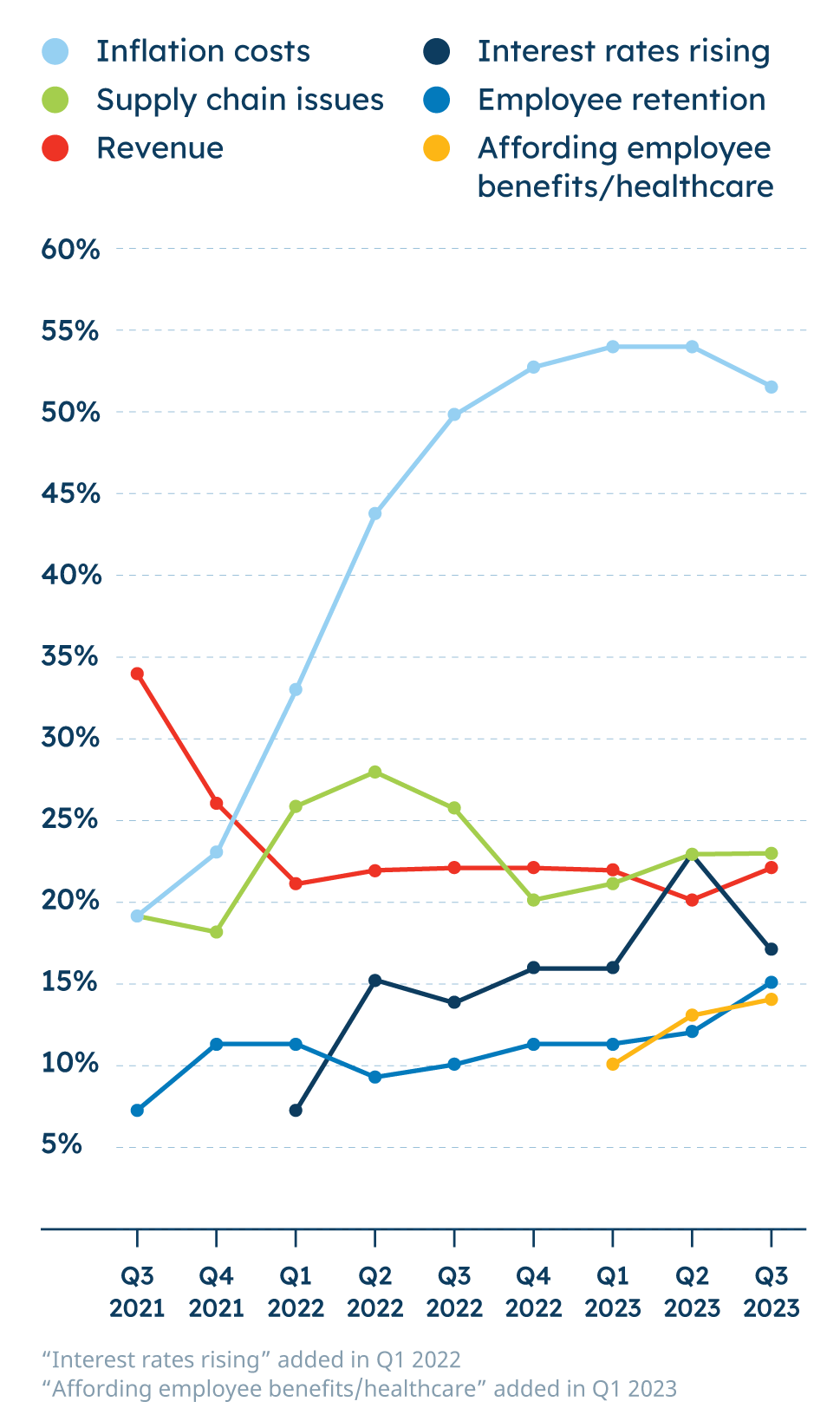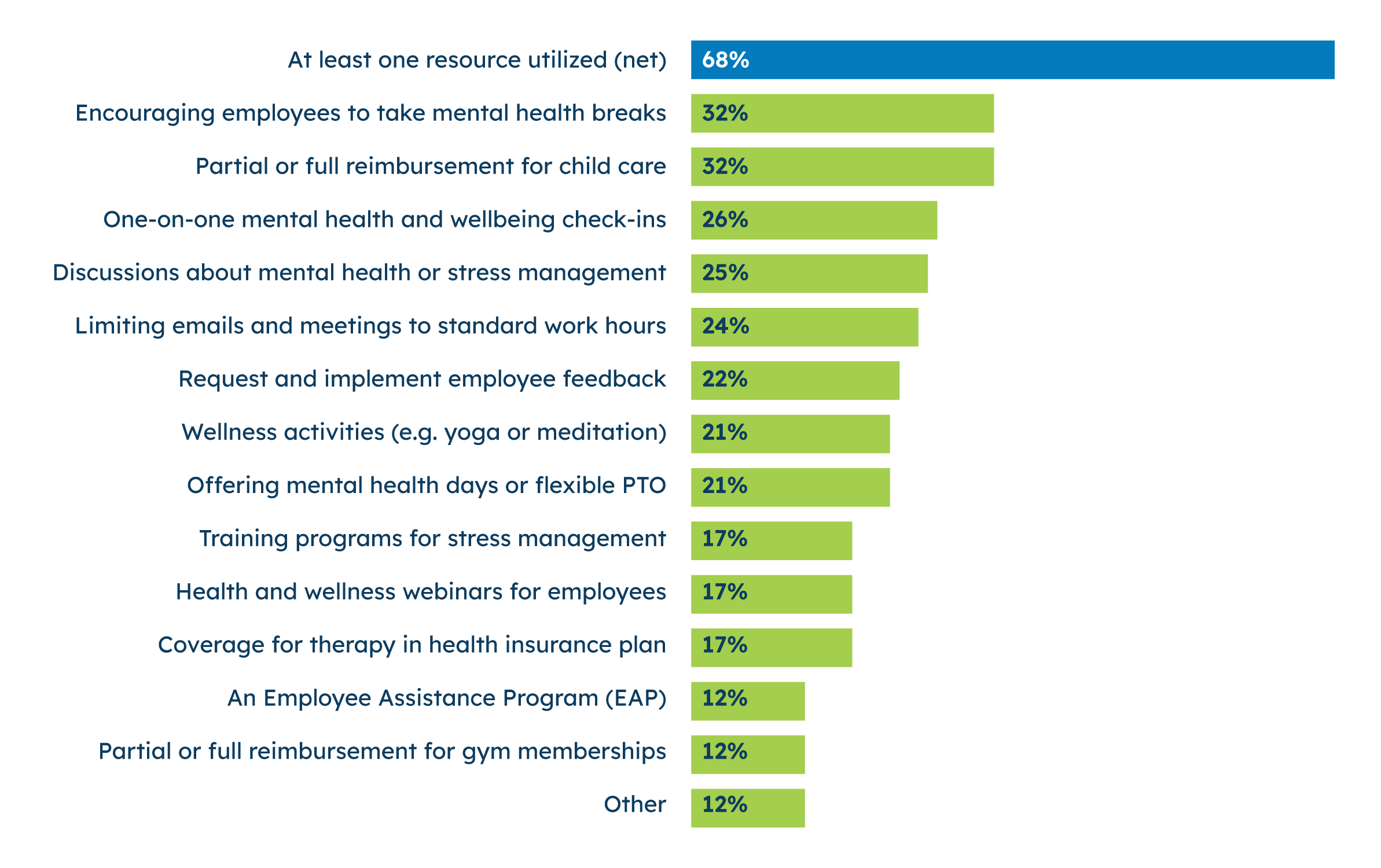Concerns about Inflation Stay Near Record Highs

Majority say keeping up with salary expectations is a challenge
Though inflation levels have eased, small businesses are still feeling its impacts. This quarter there was notable concern about wage expectations: 56% said keeping up with employee salary expectations is a challenge.
Other concerns don’t come close to registering the same level of concern as inflation. Concerns about supply chain issues, revenue, and rising interest rates continue to stay in a second tier of concerns this quarter—all measuring more than twenty percentage points lower than inflation concerns.


Concerns about employee retention creep up
However, there is a slow uptick in other concerns, such as employee retention and being able to afford employee benefits.
For example, small businesses are twice as likely to say employee retention is one of their biggest challenges compared to two years ago (15% vs. 7% in Q3 2021). Likewise, 14% say affording employee benefits or healthcare is a top concern (10% said this was a top concern in Q1 2023).
Most small businesses (56%) say it is challenging to keep up with their employees’ salary expectations or demands. In addition, half (52%) of small businesses say they are concerned about employee retention issues caused by stress or burnout.
As small businesses begin to feel more optimistic about the economy and their day-to-day operations, perhaps they are focusing more on improving their business over the long term by retaining the right talent.
Building Momentum, Alexandria, VA
Small Businesses Say They Are Slightly Less Worried about Interest Rates
Concerns around rising interest rates have slightly declined this quarter. Small businesses are slightly less concerned about interest rate hikes (17% say it’s one of their biggest challenges, while 23% said it was a top concern in Q2 of this year). This is similar to levels from late 2022 and early 2023.
In addition, slightly fewer small businesses say rising interest rates are limiting their ability to raise capital or financing for their business (70% in Q3 vs. 76% in Q2 2023). Significantly fewer say they are either concerned about rising interest rates making it harder to pay back current loans (62% vs. 74% in Q2 2023) or think it is harder to borrow money for their business from banks because they are tightening lines of credit (62% vs. 73% in Q2 2023).
Despite these shifts, however, it is important to note that a majority of small business owners still express concerns about the potential impact of rising interest rates on their businesses. 86% of respondents say that small businesses are the most vulnerable to rising interest rates.
Concerns about the impact of rising interest rates are generally consistent across regions, business size, and sector. Nevertheless, female-owned small businesses are more likely than male-owned small businesses to say they are concerned about rising interest rates making it harder to pay back current loans (67% vs. 59%, respectively). They are also more likely to say it is harder to borrow money for their business because of tightening lines of credit (68% vs. 58%, respectively). These significant differences, not present last quarter, emerged as male-owned small businesses are slightly more optimistic about the effects of interest rates on their financing while female-owned small businesses maintain a similar level of concern since last quarter.

Small Businesses Make Mental Health a Priority
About half (52%) of small businesses say they are concerned about employee retention issues caused by stress or burnout, and many report actively offering resources to support employee mental health and well-being.
This quarter, 70% of small businesses say they are actively addressing employee mental health as a priority. This has increased since Q3 2021, when 60% said the same. Additionally, most of these small business owners or decision makers report working to prioritize employee mental health regardless of region, employee size, sector, or gender of ownership.
Notably, small businesses owned by baby boomers or older generations are less likely to say their business is actively addressing employee mental health as a priority compared to those owned by Gen Zers, millennials, and Gen Xers (56% for boomers vs. 75% for Gen Z/millennials, and 71% for Gen Xers).
Most small businesses (68%) report utilizing at least one resource to assist with employee mental health and well-being this quarter. Small businesses most commonly report encouraging employees to take mental health breaks during work hours (32%) or offering partial or full reimbursement for childcare (32%). After that, about a quarter say they offer one-on-one check-in meetings to discuss mental health and wellbeing (26%), have discussions about mental health and stress (25%), or limit emails and meetings to standard work hours (24%). Most of these measures are consistent with those recorded in Q1 2021.
Overall, the smallest small businesses (those which employ fewer than five people) are less likely to say they offer one of the listed mental health resources, though a majority of them still do. What a small business actually offers also depends on size. These reported differences suggest that small business owners are increasingly able to utilize resources to assist with employee well-being as they grow and hire more staff.

Most small businesses say their size helps retain staff
Most small businesses see their uniquely tight-knit environment as a competitive advantage.
Roughly nine in ten small businesses agree that their company feels like a family and that this environment has helped them retain employees (89% vs. 77% in Q3 2021). Similarly, four in five small businesses (82%) agree that small businesses are uniquely qualified to provide employees with connections to—and support from—upper management.
A majority of small businesses—regardless of region, number of employees, sector, or gender of ownership—agree with these sentiments, emphasizing the advantage of a “family feel” and unique support from upper management when it comes to employee retention. Of note, however, the reported benefit of a family feel on employee retention is more pronounced for small businesses with 5-19 employees than those larger small businesses with 20-500 employees (92% vs. 84%, respectively). Eighty-eight percent of those with fewer than five employees say the same about the reported benefit of a family feel on employee retention.


